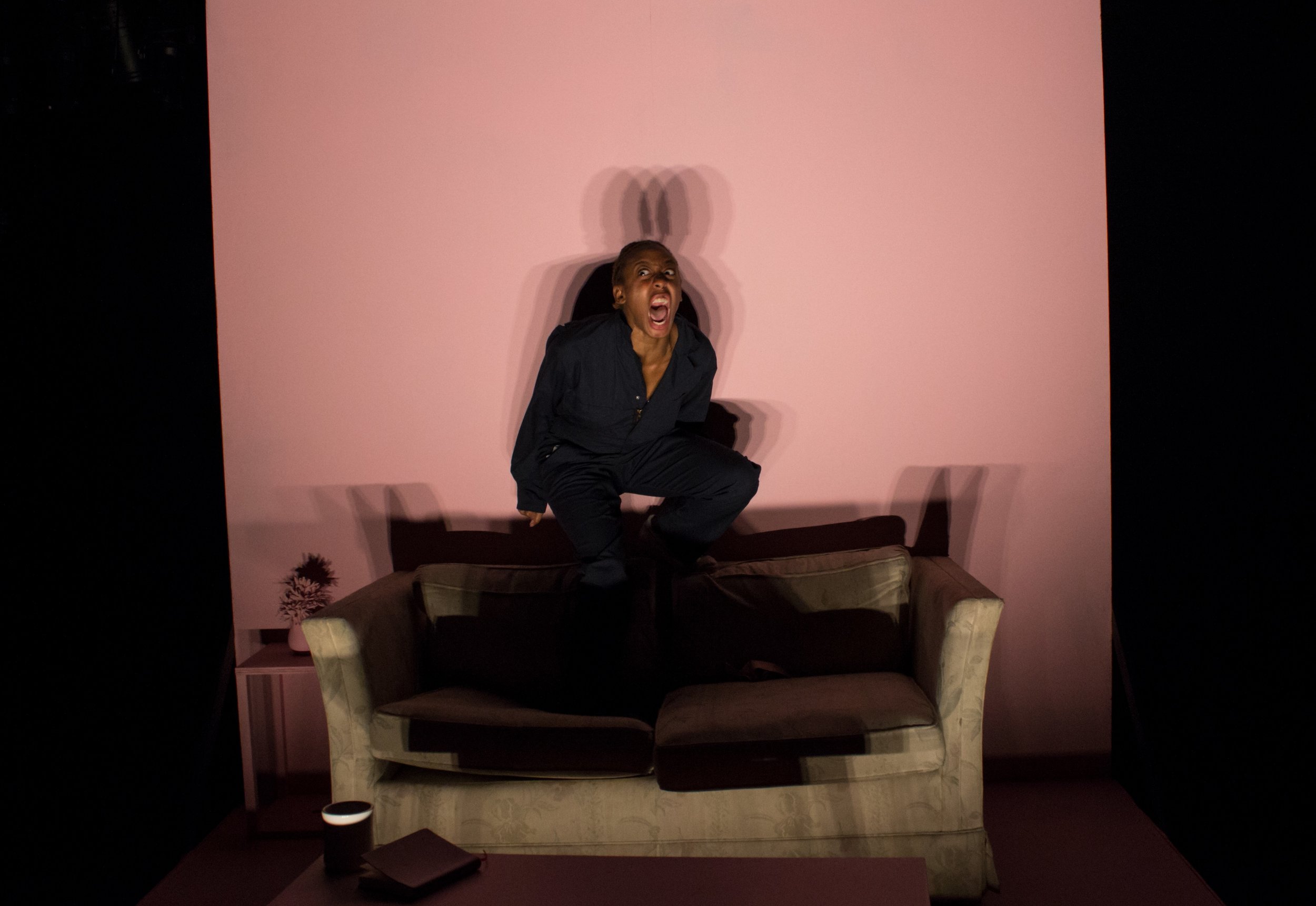Review of the feels… (kms), Yale Cabaret
In the feels… (kms), second-year Yale School of Drama playwright Jeremy O. Harris takes us on a tour of what might be his own psyche. Or maybe it’s just a series of vignettes on what he considers to be the inevitable tropes of theater about identity: love stories, family stories, stories from education, stories about race, about sex, and about the elective affinities in the world of art and music and online and what-have-you.
On stage, five actors play-out various fantasies, all ending with a “kms” (“Kill myself”) moment. Now one, now another holds a microphone and narrates the perspective of “the playwright.” Meta-comments abound. So much so, that we are never anywhere but in the space of (self-)conception. The “kms” moment arrives at the disjunction between one’s desired self and the self one is stuck with.
Amandla Jahava in "the feels... (kms) (photos by Brittany Bland)
Harris has a restless imagination, the kind that lends itself well to theater in a basement. This play, from his first year in the school, was proposed by second-year actor Amandla Jahava, and she leads the cast of five in very vigorous enactments of the figments of Harris’ imaginative engagement with what it means to be black, gay, and a playwright—not necessarily in that order and mostly all at once.
Much of what gets said amounts to a meditation on the act of playwriting—which might include reflections on writing or on the status of LeRoi Jones/Amiri Baraka when he wrote Dutchman in 1964. The Booth/Lincoln scene from Suzan-Lori Parks’ Topdog/Underdog shows up as a mutually supportive moment of assassination. There’s also a passage about the interplay of autobiography and fiction. The boundary between the two has been “blurred” so often we can say we live in a perpetual blur. Harris seems to embrace the possibilities suggested by a word used for a panel I was on a couple years ago: “autobiografiction.” Things may be “true” to life or/and they might be “true” to fantasy. And isn’t fiction a kind of “true” fantasy anyway?
Amandla Jahava, Michael Breslin, Abubakr Ali, Patricia Fa'asua
The cast, all of whom have worked with Harris before, are complicit with his vision to a striking degree, delivering inspired turns. These are not simply players enacting roles but interpreters who find unique ways to register what is demanded of them. It’s the kind of performance piece that makes the most of the Cabaret’s intimacy and the sense that something unprecedented, if not unrehearsed, could happen at any moment. Abubakr Ali, Michael Breslin, Patricia Fa’asua, Amandla Jahava, Jakeem Powell, each has a dominant tone and a unique manner of death, but each is also able to play archly with the audience and with the notion of both being in a play and commenting on its staging.
Breslin does an amazingly limber enactment of joy at the phrase “I love you,” and proceeds to imitate an inflatable doll. Powell performs an array of calisthenics while carrying on with his monologue, beating himself up about his body. Fa’asua dances hyperkinetically to a song we can’t hear. Ali strides about like an unsettling master of ceremonies, and Jahava plays out the final vignette with a striking mix of tragi-comedy, a clown of fatalism.
Jakeem Powell, Amandla Jahava, Michael Breslin
One of the most memorable aspects of the performance is how physical it is—appropriate for a play where words can be traps, and explanations and interpretations are not to be trusted. We’re told “don’t interpret this” at one point; at another, a microphone is aimed at random audience members as they are asked to interpret dreams written in and read from a notebook.
Harris likes flirting with psychoanalyzing himself though he seems to resist what he thinks that discipline will tell him. In a sense, the actors are his avatars, playing out ideas—a mother who drinks bleach, a father who uses a belt on his wailing son, a visit to a counselor (“am I a sociopath?”). At some point, each actor takes a prop from one of the open-frame boxes hanging from the ceiling and uses it for the “kms” conclusion of the enacted monologue. The ends are all bad, reminiscent of the litany of ways to end it all in Dorothy Parker’s wry “Resumé.”
Razors pain you;
Rivers are damp;
Acids stain you;
And drugs cause cramp.
Guns aren’t lawful;
Nooses give;
Gas smells awful;
You might as well live.
And, if you’re going to live anyway, you might as well write.
Jakeem Powell
the feels… (kms)
By Jeremy O. Harris
Facilitators: Amandla Jahava & Ari Rodriguez; Producer: Dani Barlow; Set Designer: Riw Rakkulchon; Costume Designer: April M. Hickman; Lighting Designer: Erin Earle Fleming; Sound Designers: Megumi Katayuma & Kathy Ruvuna; Technical Director: William Neuman; Stage Manager: Julia Bates
Cast: Abubakr Ali, Michael Breslin, Patricia Fa’asua, Amandla Jahava, Jakeem Powell
Yale Cabaret
November 29-December 2, 2017






















